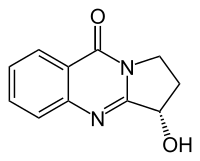Vasicinone
 | |
| Names | |
|---|---|
| IUPAC name
(3S)-3-Hydroxy-2,3-dihydro-1H-pyrrolo[2,1-b]quinazolin-9-one | |
| Identifiers | |
| 486-64-6 | |
| Jmol-3D images | Image |
| PubChem | 442935 |
| |
| Properties | |
| Molecular formula |
C11H10N2O2 |
| Molar mass | 202.21 g·mol−1 |
| Density | 1.5 g/cm3 |
| Melting point | 200 to 202 °C (392 to 396 °F; 473 to 475 K) |
| Boiling point | ) |
| Except where noted otherwise, data is given for materials in their standard state (at 25 °C (77 °F), 100 kPa) | |
| Infobox references | |
Vasicinone is a quinazoline alkaloid. It shows bronchodilatory activity in vitro[1] but bronchoconstrictory activity in vivo.[2] Vasicinone was shown to have an antianaphylactic action.[3]
Vasicinone has also been studied in combination with the related alkaloid vasicine. Both the alkaloids in combination (1:1) showed pronounced bronchodilatory activity in vivo and in vitro.[4] Both alkaloids are also respiratory stimulants.[4] Vasicine has a cardiac–depressant effect, while vasicinone is a weak cardiac stimulant; the effect can be normalized by combining the alkaloids.[4][3] Vasicine is reported to have a uterine stimulant effect.[3]
References
- ↑ Amin, A. H.; Mehta, D. R. (1959). "A Bronchodilator Alkaloid (Vasicinone) from Adhatoda vasica Nees". Nature 184 (4695): 1317–1317. doi:10.1038/1841317a0. ISSN 0028-0836.
- ↑ Mehta, D. R.; Naravane, J. S.; Desai, R. M. (1963). "Vasicinone. A Bronchodilator Principle from Adhatoda Vasica Nees (N. O. Acanthaceae)". The Journal of Organic Chemistry 28 (2): 445–448. doi:10.1021/jo01037a041. ISSN 0022-3263.
- ↑ 3.0 3.1 3.2 Rajani, M; Soni, S; Anandjiwala, She; Patel, G et al. (2008). "Validation of different methods of preparation of Adhatoda vasica leaf juice by quantification of total alkaloids and vasicine". Indian Journal of Pharmaceutical Sciences 70 (1): 36. doi:10.4103/0250-474X.40329. ISSN 0250-474X.
- ↑ 4.0 4.1 4.2 Avula, B. et al. (2008). "Quantitative determination of vasicine and vasicinone in Adhatoda vasica by high performance capillary electrophoresis" (PDF). Die Pharmazie – An International Journal of Pharmaceutical Sciences 63 (1): 20–22. doi:10.1691/ph.2008.7175.